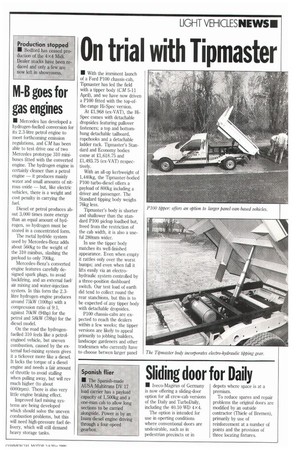M - B goes for
Page 37

If you've noticed an error in this article please click here to report it so we can fix it.
gas engines
• Mercedes has developed a hydrogen-fuelled conversion for its 2.3-litre petrol engine to meet forthcoming emission regulations, and CM has been able to test drive one of two Mercedes prototype 310 minibuses fitted with the converted engine. The hydrogen engine is certainly cleaner than a petrol engine — it produces mainly water and small amounts of nitrous oxide — but, like electric vehicles, there is a weight and cost penalty in carrying the fuel.
Diesel or petrol produces about 3,000 times more energy than an equal amount of hydrogen, so hydrogen must be stored in a concentrated form.
The metal hydride system used by Mercedes-Benz adds about 560kg to the weight of the 310 minibus, slashing the payload to only 700kg.
Mercedes-Benz's converted engine features carefully designed spark plugs, to avoid backfiring, and an external fuel/ air mixing and water-injection system. In this form the 2.3litre hydrogen engine produces around 75kW (100hp) with a compression ratio of 9:1, against 70kW (94hp) for the petrol and 58kW (78hp) for the diesel model.
On the road the hydrogenfuelled 310 feels like a petrolengined vehicle, but uneven combustion, caused by the external fuel-mixing system gives it a tickover more like a diesel. It lacks the torque of a diesel engine and needs a fair amount of throttle to avoid stalling when pulling away, but will rev much higher (to about 6000rpm). There is also very little engine braking effect.
Improved fuel mixing systems are being developed which should solve the uneven combustion problems, but this will need high-pressure fuel delivery, which will still demand heavy storage tanks.








































































































































































